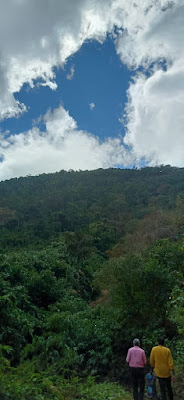Aging at Marmala Waterfall
 |
| Marmala Waterfall Pic by Noel Joseph |
Audrey Hepburn thought that a
woman would grow more beautiful with age because “the beauty of a woman is not
in a facial mole but … is reflected in her soul.” The caring nature is the real
beauty of women, she said, and that quality only gets better as a woman ages. Passion
is another aspect that makes women beautiful and age doesn’t affect that too,
according to Hepburn.
 |
| Marmala landscape Pic by Navya Joseph |
As I visited the Marmala
Waterfalls in central Kerala along with a few family members this Sunday, I
became acutely aware of my vanishing passions. The place had a unique charm, a
pristine beauty, because it has not yet been ravaged by massive tourism. The
waterfall lies tucked away in the hills which are not easily accessible. There
is a very narrow road leading to it from Theekoy in Kottayam district. If
another vehicle comes from the opposite direction you will need great manoeuvring
skills of driving. It prompted my nephew, Noel, to remark innocently that a
small car like mine (Maruti Alto 800) has its advantages on a trip like this.
It was his remark that made me realise that I was not a bad driver after all.
It then led me to the thought why I had become so listless even on a trip like
this which would have filled me with ecstasy until a few years ago.
 |
| Noel and Navya with their parents |
Hepburn was speaking about
women. I am more inclined to go with Bernard Shaw who said that “You don’t stop
laughing when you grow old, you grow old when you stop laughing.” Why did life
steal my smiles, let alone laughs?
I put aside that thought and
enjoyed the trip as best as I could. I did make an effort to smile.
It doesn’t usually take two
days for me to write a post about a trip I made. In spite of the fact that I
enjoyed the trip, this post was delayed. Even now I had to force myself to
write this. Something is changing in the new year. I’m yet to figure out what.
Real classes began at school
for class 12 and I was happy to be back in a real classroom. But the masks on
the faces of the students and their total indifference put me off again. I hope
the 17-year-old students will overcome their inertia and bubble with at least
as much energy I possess at the age of 60.
 |
| The way to the waterfall Pic by Noel |
I’m becoming hyper-conscious
of my age, it looks like. It reminds me of Jules Renard’s words: “It’s not how
old you are, it’s how you are old.” I hope Marmala’s gentle gurgles and
tickling landscapes will refresh me in this new year. I don’t want to be old
yet.
❤️✨🥳
ReplyDelete🥰🥰🥰
ReplyDeleteMaybe you're on the verge of discovering new passions rather than losing them altogether 😉. Wishing you an energetic 2021. :)
ReplyDeleteThanks. Wish you too a great year ahead.
DeleteWish you a very Happy New Year Sir :)...the very fact that you do not want to be old yet... Means... That you will not get there so soon :)!Cheers to many more passions to keep making you want to not get there yet. Keep inspiring us as always :)
ReplyDeleteHappy New Year to you too.
Delete